Banishing Chapped Lips During Pregnancy: A Blissful Guide for Expectant Parents
Oh, the joy of expecting a little bundle of happiness! Pregnancy is a remarkable journey filled with many transitions, not just for your lifestyle but for your body too. As you navigate through this miraculous time, your skin, including the delicate skin of your lips, may go through some noticeable changes, leading to the common yet often overlooked concern: chapped lips during pregnancy.
But worry not, dear soon-to-be moms and supportive partners – this guide is your trusty companion in understanding and tackling those pesky, dry lips. Let’s turn that frown upside down and transform those chapped lips into a smile as radiant as your pregnancy glow!
Understanding Chapped Lips in Pregnancy
First things first, let’s get to know our uninvited guest: chapped lips, also known as cheilitis. During pregnancy, your body is a hub of hormonal activity – these hormonal fluctuations, along with increased blood volume and changing hydration levels, can make your lips more vulnerable to dryness. Add external factors like weather changes, air conditioning, and certain vitamin deficiencies into the mix and voila – chapped lips take center stage.
But here’s the good news – this is a totally manageable concern! With some tender love, care, and hydration, you can kiss those chapped lips goodbye (pun intended).
Hydration is Key
H2O is your BFF when it comes to combating chapped lips. Hydration from the inside out is crucial. Your body needs more fluids than ever right now, and drinking ample water will not only help your overall health but also keep your lips moist and luscious.
Proper Lip Care Routine
Like your skincare routine, your lips deserve a regimen tailored to their needs. Using the right lip products, like balms enriched with natural oils or butters, can create a barrier to lock in moisture and protect your lips from the elements. Additionally, exfoliating gently with a soft toothbrush or homemade sugar scrub can help remove dead skin and allow healing products to penetrate better. Ensure to use gentle motions to avoid further irritation.
Nutrition for Nourishment
Paying close attention to your diet is also paramount for preventing and treating chapped lips. Foods rich in omega-3 fatty acids, vitamin B, and vitamin E can give your skin the boost it needs to stay supple and soft. Snacking on avocados, munching on almonds, and including fish like salmon in your meals are deliciously effective ways to nourish your skin from the inside.
Don’t forget prenatal vitamins! These are meticulously formulated to support both mother and baby during pregnancy and often include the necessary nutrients for healthy skin maintenance.
Caring for chapped lips during pregnancy does not need to be a complex puzzle. With consistent care, good hydration practices, and nutrient-dense meals, you can maintain healthy, hydrated lips throughout your pregnancy journey. Remember, it’s not just about looking good – it’s about feeling your best as you prepare to welcome your little one into the world.
Tell you what, we’re just warming up! There’s so much more to dive into when it comes to keeping those lips plump and pain-free throughout your pregnancy, including recommended products, home remedies, and expert tips. Stay tuned for our next segment where we unveil even more secrets to achieving soft, kissable lips as you countdown to your due date. Because in parenthood, it’s the small comforts that often make a big difference.

Five Essential Tips for Managing Chapped Lips in Pregnancy
1. Stay Hydrated Inside Out
During pregnancy, your need for fluids increases to support the growing life inside you. Your body is working overtime, and adequate hydration can help keep those lips from chapping. Aim for at least 8-10 glasses of water daily—and more if you’re active or it’s hot outside. This simple act of self-care keeps your skin, including your lip tissue, hydrated and healthy.
2. Choose Lip Products Wisely
The lip balm aisle can be overwhelming, but it’s important to look for products designed to nourish and protect. Opt for balms containing natural moisturizers such as beeswax, shea butter, or coconut oil. Avoid additives like camphor, eucalyptus, and menthol, as they can dry out your lips further. Look for a product with sun protection factor (SPF) during the day, as increased skin sensitivity during pregnancy can make you more prone to sunburn.
3. Embrace a Balanced Diet
Your diet directly impacts skin health, so fill your plate with foods that nourish and repair. Foods rich in vitamin C, like oranges and strawberries, help promote skin elasticity. Those rich in vitamin E, such as nuts and green leafy vegetables, act as antioxidants, protecting skin cells from damage. Including these nutrient powerhouses in your diet supports your overall health and your lips’ well-being.
4. Avoid Licking Your Lips
It might feel like a quick fix, but licking your lips can lead to a vicious cycle of dryness. Saliva evaporates quickly, taking away natural oils and leaving lips drier than before. To keep lips moist, carry your chosen lip balm with you, applying it whenever you have the urge to lick your lips. Break the habit and help your lips retain their natural moisture.
5. Humidify Your Environment
Pregnancy might make you more sensitive to your surroundings, including the humidity in the air. Dry indoor air, especially from heating systems during colder months, can sap moisture from your skin and lips. Consider using a humidifier in your home to add moisture back into the air, making it more comfortable for you and helping to alleviate chapped lips.
These proactive steps are incredibly beneficial as you make your way through the amazing journey of pregnancy. Regularly practicing these tips will help ensure that chapped lips are one less concern as you focus on the adventure of welcoming a new life into the world. Keep glowing, keep growing, and keep those lips soft and smooth!
See more great Things to Do with Kids in New Zealand here. For more information see here
Disclaimer
The articles available via our website provide general information only and we strongly urge readers to exercise caution and conduct their own thorough research and fact-checking. The information presented should not be taken as absolute truth, and, to the maximum extent permitted by law, we will not be held liable for any inaccuracies or errors in the content. It is essential for individuals to independently verify and validate the information before making any decisions or taking any actions based on the articles.




